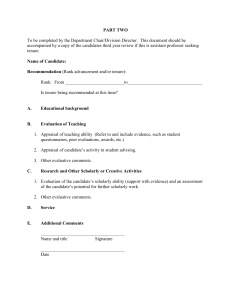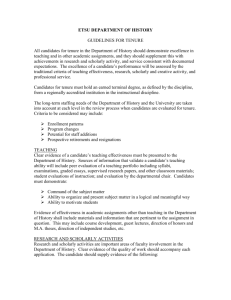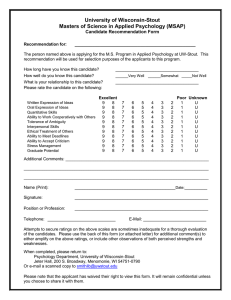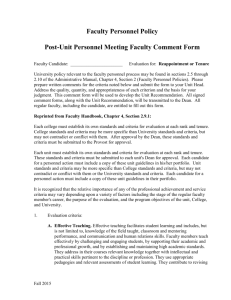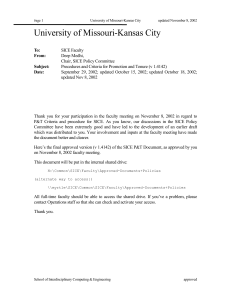DEPARTMENT OF PSYCHOLOGY
advertisement
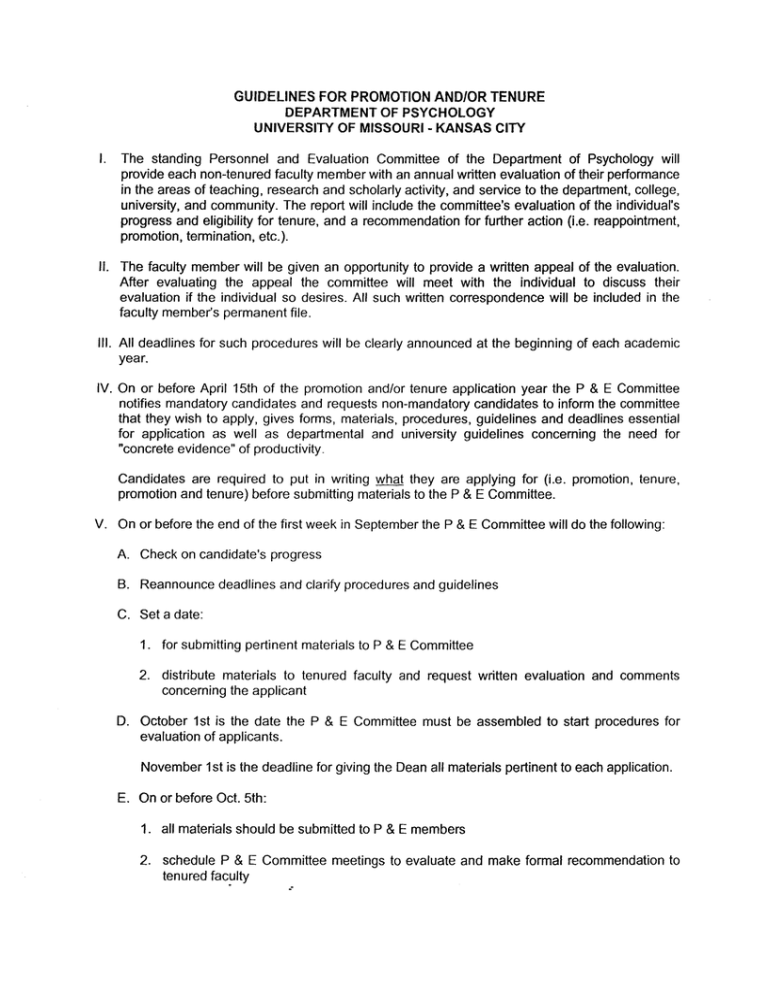
GUIDELINES FOR PROMOTION AND/OR TENURE DEPARTMENT OF PSYCHOLOGY UNIVERSITY OF MISSOURI - KANSAS CITY I. The standing Personnel and Evaluation Committee of the Department of Psychology will provide each non-tenured faculty member with an annual written evaluation of their performance in the areas of teaching, research and scholarly activity, and service to the department, college, university, and community. The report will include the committee's evaluation of the individual's progress and eligibility for tenure, and a recommendation for further action (Le. reappointment, promotion, termination, etc.). II. The faculty member will be given an opportunity to provide a written appeal of the evaluation. After evaluating the appeal the committee will meet with the individual to discuss their evaluation if the individual so desires. All such written correspondence will be included in the faculty member's permanent file. III. All deadlines for such procedures will be clearly announced at the beginning of each academic year. IV. On or before April 15th of the promotion and/or tenure application year the P & E Committee notifies mandatory candidates and requests non-mandatory candidates to inform the committee that they wish to apply, gives forms, materials, procedures, guidelines and deadlines essential for application as well as departmental and university guidelines concerning the need for "concrete evidence" of productivity. Candidates are required to put in writing what they are applying for (Le. promotion, tenure, promotion and tenure) before submitting materials to the P & E Committee. 2. distribute materials to tenured faculty and request written evaluation and comments concerning the applicant D. October 1st is the date the P & E Committee must be assembled to start procedures for evaluation of applicants. 2. schedule P & E Committee meetings to evaluate and make formal recommendation to tenured fac~lty 4. Assuming consistent satisfactory performance of the non-tenured faculty member, a recommendation for granting tenure will be made during the mandatory year. Only under very unusual circumstances would this recommendation not be made as it is assumed that consistent unsatisfactory performance would have led to termination at an earlier date. 5. If the committee recommendation is negative and promotion and/or tenure is not mandatory the applicant has the option of requesting or not requesting a tenured faculty discussion, evaluation and/or vote and submission of materials to the Dean, or resubmitting at a later date. 6. The tenured faculty must meet, discuss, evaluate, and submit a recommendation to the Dean when a mandatory decision is required. At any time during the probationary term a contract will be recommended to be a terminal one under any of the following conditions: A. A two-thirds vote by the entire staff of the Psychology Department in favor of a terminal contract. In fairness to the individual involved, two warnings will be given in which specific behaviors are expected prior to the issuance of a terminal contract. C. Clear, sustained, concrete demonstrations of "exceptional performance and productivity" in the areas of teaching research and service. Information on the candidate's past and current personal and professional contributions are jUdged against expected performance over the customary six year period. VIII. Specific guidelines for evaluating all relevant criteria are detailed in the procedures manual of the department. The Department of Psychology has the following supplemental stipulations to the Promotion and Tenure Guidelines of the College of Arts & Sciences. (1) Over the course of the probationary period, the department expects each faculty member to have a publication record that will earn them the rating of "meets expectations" or "exceeds expectations" for a faculty member on a research track. This translates to two publications per year, or a minimum or I 0 publications at the time the portfolio is submitted, with an additional two or more in the pipeline, and annual presentations at national or international conferences in the candidate's area of expertise. This number is not firm, as publications vary in quality and impact, and these factors will also be considered. Publications will typically be peer-reviewed journal articles. • Grants, book chapters, and edited books provide additional evidence of scholarly activity and strengthen the candidate's portfolio, but they are not substitutes for peer reviewed publications. (2) The candidate should demonstrate that she or he has developed an independent program ofresearch. Evidence ofthis is most often first-authored publications, having a funded research grant at the level of PI, and/or publications with graduate students. (3) The candidate should have evidence that their scholarly work is having an impact in their field, as demonstrated by external reviewers' evaluations, citations, request for participation on grant panels, government committees, editorial boards, etc. (1) Candidates should demonstrate consistently satisfactory course evaluations (3.5 on a 5.0 scale). In the case of marginal or low evaluations, the candidate should be able to document that he or she has made consistent efforts to improve his/her teaching. Such documentation may include a pattern of improving evaluations, participation in teaching seminars, seeking mentored teaching experiences, etc. • Other evidence ofteaching excellence, while not substituting for satisfactory evaluations, may include activities such as creation of a new course, significant revision of an existing course, development of a service-learning course or component, infusion of a teaching innovation, etc. (2) In addition to demonstrating satisfactory classroom teaching, candidates should demonstrate evidence of ongoing informal teaching/mentoring through involvement on honors, thesis, and doctoral committees, as well as presentations and publications that include students. (1) The candidate is expected to demonstrate significant service to the university community (Department, College, Campus, and University), the scholarly community, and the Kansas City community. There is no firm number of service activities required for Promotion & Tenure because of the great variability in workload associated with these activities. Rather, the candidate is expected to document a range of service activities that, as a whole, convey a strong sense of commitment to the department, university, and community. • Examples of department service include membership on program committees, search committees, and student committees (e.g., honors, thesis, and doctoral), as well as administrative roles such as a program director, Director of Undergraduate Advising, or Faculty Advisor for Psi Chi, etc. • Examples of College, Campus, and University service include membership on campus or university committees, College or campus search committees, or serving as the department representative for activities such as student recruitment, advising, and orientation. • Examples of service to the scholarly community include serving as a manuscript reviewer, member of an editorial board, journal editor, as well as service as a grant reviewer for local, national, or international funding agencies, service to professional organizations, etc. The Department of Psychology will follow the Policies and Procedures for Promotion and/or Continuous Appointment at the University of Missouri - Kansas City provided in Chancellor's Memorandum #35 with the following provision: A critical aspect ofthe department-level review is a vote by the department P & T committee to support or not support the P&T request. Although the overall result ofthis vote will be conveyed to the candidate as supporting or not supporting the application, the details ofthe vote (specific tally) will not be released. Chancellor's Memorandum #35 can be found at the following location: http://www.umkc.edu/provost/policies/promotenure/chanmem035.htm
